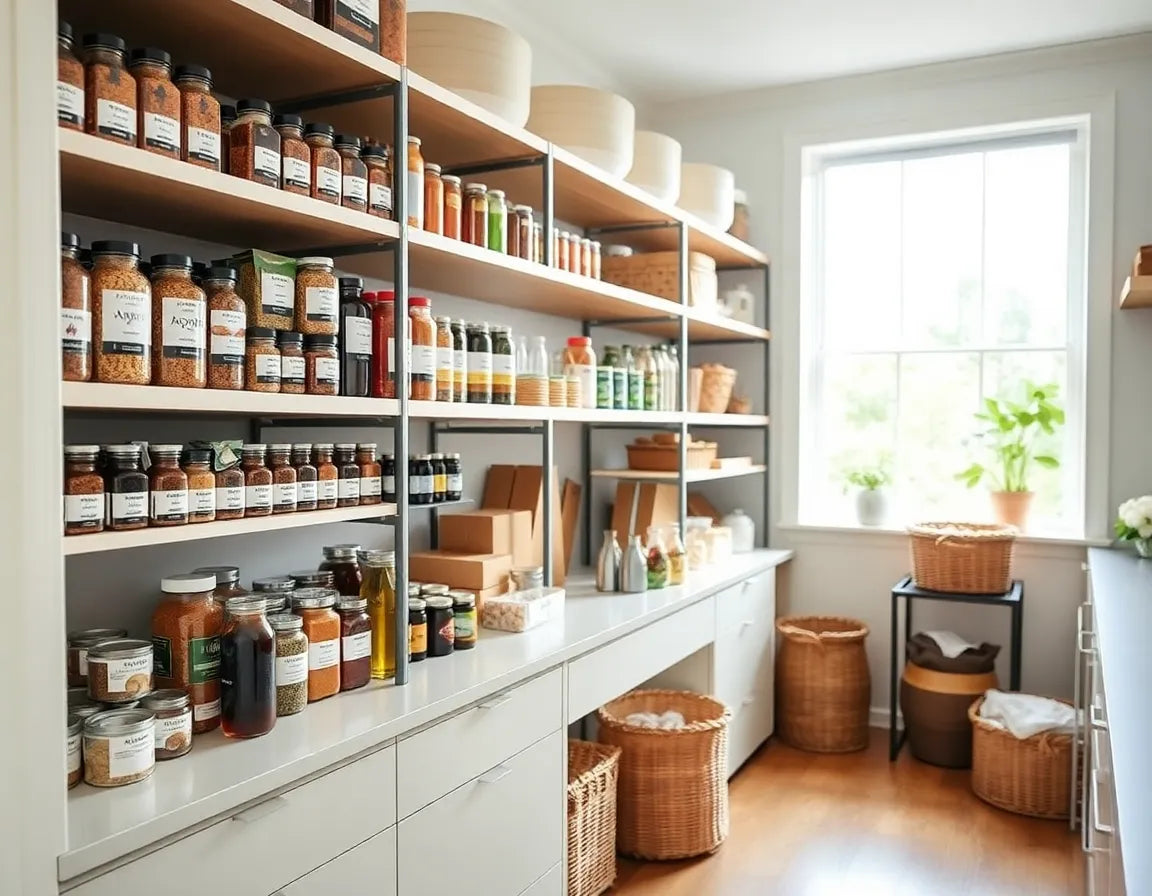Do you ever open your pantry and feel like it’s bursting with food, yet you still can’t find what you need?
We’ve heard this story from countless Australian households, and it’s one we know all too well. Pantries fill up fast, with packets, tins, and jars shoved into every corner. What we’ve found speaking to our customers is that with the right setup and habits, a pantry can feel more organised, accessible, and even enjoyable to use. Here’s our complete guide to making that happen.
Start fresh with a full reset
The first step is always to take everything out. Lay items across your kitchen bench or table so you can see the whole picture. Then:
-
Check expiry dates and dispose of what’s no longer safe
-
Donate food you know you won’t eat
-
Group what’s left into rough categories
From there, you’ll have a clear idea of what needs to go back and where it might fit best.
Group items into clear categories
We’ve seen pantries stay far neater when food is grouped by type. Keeping all the grains together, snacks in one spot, and canned goods on their own shelf makes it easier to grab what you need. It’s the same logic we’ve shared in an article about fridge organisation, and it works just as well in the pantry.
Use pantry containers and canisters
Loose packets are one of the biggest causes of mess. Switching to pantry containers and canisters makes a huge difference. Clear containers mean you can see exactly what you have, they keep food fresher, and they stop half-used packets from spilling everywhere. Adding labels makes it simple for the whole family to follow the system.
[collection-carousel="pantry-containers-canisters"]
Add shelves and racks
Deep pantry shelves can lead to items disappearing at the back. We recommend adding kitchen storage shelves and racks to create multiple layers. This makes it easier to see what you have and avoids wasted vertical space. We often suggest:
-
Shelf risers for canned goods
-
Turntables for sauces and condiments
-
Corner racks for awkward spaces
[collection-carousel="kitchen-storage-shelves-racks"]
Think vertically with stackable storage
Australian homes often have tall pantry shelves that aren’t used effectively. By stacking upwards, you’ll create more usable space. We recommend stackable storage systems for grouping snacks, baking supplies, or breakfast items. It’s an easy way to add layers without renovation.
[collection-carousel="stackable-storage-systems"]
Rotate your stock
We’ve seen pantries stay more organised when households follow “first in, first out.” That means placing newer groceries at the back and moving older ones forward. It’s a simple habit that prevents food waste. Here’s another article from Choice Australia that explores food storage tips for freshness and safety.
Use pull out drawers
Deep cupboards often turn into black holes where items disappear. Adding pull out drawers solves this problem. Our 2-tier mesh pull out pantry drawer is a favourite with customers because it creates layers that slide out, making it easy to see and reach everything.
Place everyday items front and centre
We’ve noticed that pantries work best when the most-used goods are the easiest to reach. For families, that often means placing snacks on lower shelves where kids can access them. Bulky items like flour or oils usually work best lower down to prevent heavy lifting.
Give spices their own space
Spices are small but can quickly cause clutter. We recommend using a spice rack or tiered shelf insert. Keeping spices visible and grouped makes cooking smoother and avoids buying duplicates.
[collection-carousel="spice-racks"]
Organise under the sink
Many kitchens in Australia use the cupboard under the sink for extras like cleaning products or bulk storage. We always suggest using baskets, drawers, or caddies to bring order here. We’ve shared more ideas in this article, which applies just as well in the kitchen.
Label everything clearly
Labelling might feel small, but it’s a professional touch that pays off. Whether you use stickers, printed tags, or handwritten labels, the pantry feels easier to manage and more consistent. Families especially love this trick because it keeps everyone on the same page.
Store bulk buys smartly
We’ve noticed that buying in bulk is popular in many Australian homes, but large bags of rice or flour can overwhelm a pantry. Decanting into containers or keeping bulk items in tubs on the floor makes the space easier to manage without giving up the benefits of bulk shopping.
Create a snack zone
We often suggest setting aside a basket or drawer as a snack station. This keeps quick bites for kids in one place and avoids the rest of the pantry being pulled apart every afternoon. It’s a small change that makes school mornings faster too.
Consider an elfa pantry system
For those ready to take their pantry to the next level, an elfa pantry system is a smart investment. These modular designs combine shelves, drawers, baskets, and racks to create a fully organised pantry. We offer free design consultations, and many of our Australian customers have found this service invaluable.
[collection-carousel="elfa-pantry-storage"]
Improve your lighting
Lighting might sound minor, but it makes a huge difference. Adding LED strips or battery lights brightens shelves and stops food from being hidden in shadows. We’ve seen pantries feel twice as practical once lighting is added. Here’s an article showing how lighting changes the feel of small storage spaces.
We’re here to help
Every pantry is unique, and we’ve helped many Australians find solutions that fit their homes. If you’d like guidance, our home organisational services are a great place to start. And of course, you can always contact us directly for advice on your pantry project.






